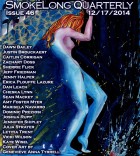So our editors at SmokeLong were torn on the ending to this story. Several of them wished that the boss had stayed dead. Can you talk about those last few lines and how you went about deciding on them? Was the boss always going to pop back up?
In the original version, the boss says that he’d rather quit himself than let the speaker go; then he jumps up and orders the male nurses from the defunct infirmary to remove the speaker. In the end nurses wheel him away on a gurney. In another version, the boss tells the employee, “if you ever need to talk, you can always call me.” In a later draft, I got rid of that ending and added the following line: “I worried that firing me had killed my boss.” I thought that the idea was funny, but somehow it didn’t read funny—not until I got rid of “I worried that.” It was much better, much sharper, much cleaner, to just have the employee believe that the boss died as a result of firing him. When I read the final version to friends, they thought the story was really funny—and that sentence worked like a punchline. I thought about ending with the death of the boss but for me the story required something else to happen. I like the quick reversal of the boss rising from his “deathbed” and shaking hands with the person he just fired.
Have you ever been laid off or fired?
I’ve been laid off/fired several times and am very familiar with what one feels—or maybe what I feel—in those situations. So many people in this country have lost their jobs. It’s really frightening. I’ve written about it in poems numerous times and more recently in stories. I hope that I’m capturing some element of the experience that is true for a large segment of the population. “Difficult Times” is a composite experience, based on my getting laid off at one job and reduced to part time at another job. The boss is a composite character, combining the features of three different people. The boss and the speaker are representational characters, not individuals, and the story proceeds through hyperbole. I think of it as a comic parable. While writing the story, I kept thinking about the teary face of one administrator and then what another administrator said to me: “We’re moving in a different direction.” Who knows what that meant?
When I was 17, I went to the same bakery every day and bought two huge marble cookies with chocolate drops in the center. After about six months, the owner, an Austrian Jewish woman, offered me a job. The moment I stepped in the backroom, I started sneezing and couldn’t stop. I sneezed in the eclairs, knocked over a bucket of lye and generally proved that I had no skills at cleaning floors or dishes. When I reported for work the next morning, the owner blocked the entry way to the kitchen with her arms folded. “I liked you better as a customer,” she said. This incident became the subject of the title poem of my fifth book, Working in Flour. My sixth Book, Pretenders, contains a poem that gives instruction on how to respond to a firing: “Note to Self on Getting Fired.”
The workplace definitely has its own culture, its own humor and sadness, even its own language. What business lingo tops your list of “phrases that need to be banned forever”? (Mine is “think outside the box”.)
“Learning Outcomes,” as in the students will demonstrate a proficiency in seven extinct languages while guzzling chocolate martinis; as in they will explore sleep, snoring, and dreams in the classroom as a means of communicating with their professors. I guess I’d also ban “assessment,” “paradigm shift,” “devoted to excellence,” and “tools of assessment,” such as tasers, razor blades under the fingernails and the good old rack. “We’ve experienced a Paradigm Shift that has resulted in a diminishment of our devotion to excellence, which we assess with our shiny, sharp tools of assessment: We conclude that we are moving in a different direction.”
You write poetry and fiction. I notice one of your flash stories was included in the anthology Flash Fiction Funny. Do you find it harder to write humorous stories than serious? What about funny poetry—do you write that as well?
I think it’s just difficult to write a good poem or story. I usually start with an image or a line or even an incident, not necessarily with the idea that it’s going to be comic or funny. I intended for “Power Point Presentation” [the story from Flash Fiction Funny] to be funny from the moment I sat down to write it—that’s unusual for me. I wanted to capture a presentation running amok on a person who has no idea how to handle the technology. But often something becomes funny in the telling. My poem “On Sex” begins: “Start without me, she says/and removes my hand from her thigh/I’ll catch up later.” That sets the tone for the rest of the poem. But I want a poem or story to do more than just be funny. It should be many things at the same time. I wrote a story titled “Bat Mitzvah Party,” recently published in the humor section of the magazine Drunken Boat. The story is about a Jewish boy who thinks he’s a Sioux warrior and ruins a girl’s party by standing in the middle of the dance floor with his arms crossed. The real-life story is serious and sad, but also comic. I wrote several pieces about this incident, most of which were very serious, but the comic piece—which I hope is funny—captures the experience best.
And on that note, what’s your favorite joke?
Well, jokes are funny in delivery, but I’ll give it a shot…here’s the basic line…
Hon, I’m so miserable without you,
it’s almost like you were here.




 The core workshop of SmokeLong Fitness is all in writing, so you can take part from anywhere at anytime. We are excited about creating a supportive, consistent and structured environment for flash writers to work on their craft in a community. We are thrilled and proud to say that our workshop participants have won, placed, or been listed in every major flash competition. Community works.
The core workshop of SmokeLong Fitness is all in writing, so you can take part from anywhere at anytime. We are excited about creating a supportive, consistent and structured environment for flash writers to work on their craft in a community. We are thrilled and proud to say that our workshop participants have won, placed, or been listed in every major flash competition. Community works.